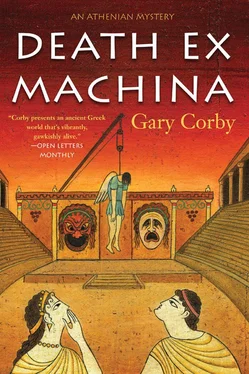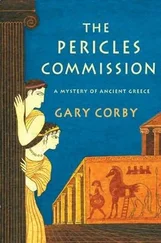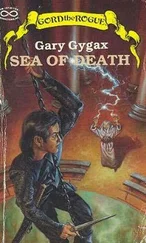Gary Corby - Death Ex Machina
Здесь есть возможность читать онлайн «Gary Corby - Death Ex Machina» весь текст электронной книги совершенно бесплатно (целиком полную версию без сокращений). В некоторых случаях можно слушать аудио, скачать через торрент в формате fb2 и присутствует краткое содержание. Год выпуска: 2015, ISBN: 2015, Издательство: Soho Press, Жанр: Исторический детектив, на английском языке. Описание произведения, (предисловие) а так же отзывы посетителей доступны на портале библиотеки ЛибКат.
- Название:Death Ex Machina
- Автор:
- Издательство:Soho Press
- Жанр:
- Год:2015
- ISBN:978-1-61695-520-5
- Рейтинг книги:3 / 5. Голосов: 1
-
Избранное:Добавить в избранное
- Отзывы:
-
Ваша оценка:
- 60
- 1
- 2
- 3
- 4
- 5
Death Ex Machina: краткое содержание, описание и аннотация
Предлагаем к чтению аннотацию, описание, краткое содержание или предисловие (зависит от того, что написал сам автор книги «Death Ex Machina»). Если вы не нашли необходимую информацию о книге — напишите в комментариях, мы постараемся отыскать её.
Death Ex Machina — читать онлайн бесплатно полную книгу (весь текст) целиком
Ниже представлен текст книги, разбитый по страницам. Система сохранения места последней прочитанной страницы, позволяет с удобством читать онлайн бесплатно книгу «Death Ex Machina», без необходимости каждый раз заново искать на чём Вы остановились. Поставьте закладку, и сможете в любой момент перейти на страницу, на которой закончили чтение.
Интервал:
Закладка:
Now she crushed my hopes by saying, “Your father is right, Nico.”
That ended it. We would have to sell the house.
SCENE 12
We all three of us traipsed to the Theater of Dionysos. Socrates wanted to see the god machine.
We found the stage manager there, though it was still early in the morning. Other than him, the theater was deserted. I noticed at once that on the back wall, someone had added a line below the No Whistling sign. The addition was in a different hand. Now it said:
NO WHISTLING!
and watch your feet-don’t trip or fall
I felt it was good advice, but hardly needed saying.
Or did it? Romanos had tripped over the dangerously placed broom. That could have broken his leg. Lakon had almost fallen from the sabotaged balcony. That could have ended with a broken limb, or a broken neck. Phellis had fallen heavily and now his leg was crippled.
“You back again?” the stage manager said when he saw us. He held an actor’s mask in his hands.
“There’s a criminal assault to avenge,” I said.
He grunted. “I visited Phellis last night.”
“How was he?”
“Tied up in that machine in the doctor’s house, but he wasn’t screaming. Doctor said the leg was as good as you could expect. He also said Phellis can never act again.”
“I’m sorry.”
“Yeah, me too. All right, I can’t say I like having you amateurs behind the skene, but I guess I got no choice.”
“You’re here early,” I said.
“It occurred to me nothing got put away properly last night,” he said. “After all the rain I thought I better check the damage. Look at this.” He swore as he held up the mask that had been in his hands. “Someone left it lying on the ground. It’s ruined now.”
It did indeed look the worse for wear: muddy, and the material was splotched.
The stage manager tossed the mask onto the bench beside him.
“Can I have a look?” Diotima said, and before the stage manager could object she picked it up.
“Here, you’re a woman-”
“Yes, I’d noticed.” Diotima spoke through the mask. There were eye holes to see through and a mouth through which to speak. She looked very strange to me with the rigid mask covering her face.
“Acting’s not for women,” the stage manager said. “That’d be immoral.”
“Sir? Then who plays the women characters?” Socrates asked.
“The men do. That’s moral. If a woman was on stage, all the men would be ogling her, right?”
“Of course,” I said.
“Well, that isn’t right, is it? Would you want your daughter on stage, and a horde of men eyeing her? Thinking about her because they want to … well, do you-know-what with her.”
When he put it like that … “No, you’re right,” I said. “I definitely wouldn’t want my daughter on stage, if I had one.”
“Well then, there you are. Every woman is someone’s daughter. The only proper thing to do is not allow the ladies on stage.”
“It’s ridiculous,” Diotima said, in an irritated tone. “If women can be priestesses then they can be actresses, can’t they? Priestesses perform in public and everything’s fine.”
“It’s like this, young miss-”
“I am Diotima, the wife of Nicolaos.”
“If you got up on stage, a lady who looks the way you do-” He looked her up and down, then said, “If you were up there, we’d have to beat back the audience with shovels.” He shook his head. “It just wouldn’t work out. No one would pay attention to the play.”
The cast spent the next two days in intense work. And so did I. I didn’t take my eyes off the actors, the stage or the backstage area for a moment while the crew were there. Of course I couldn’t see all those things at once. I had to constantly run from the back to the front and then back again. I felt like a parent with twenty children. My constant movement irritated the actors and everyone who supported them, yet no one complained. They knew as well as I did that whoever was set to sabotage the play was still out there, waiting for an opportunity.
But I couldn’t be there all night as well. I went to see Pythax, to beg the loan of two of the Scythian Guard. There are three hundred of these guards, all of them barbarian slaves, their job to patrol the streets and keep the peace. My father-in-law Pythax was their overseer.
Pythax was good to me, as he always is. He arranged for two of his men, Euboulides and Pheidestratos, to be detached to my service. I ordered them to protect the theater at night. I specifically wanted two guards so that they would keep each other awake. A man on his own can easily doze. They took the moonlight shift and I relieved them each dawn.
Throughout the rehearsals, Romanos was a workhorse. He was first at the theater every morning. He was last to leave. There was no task too small that he wouldn’t lend a hand. There was no task so large that he was daunted. When anyone expressed doubt that the play could be ready on time, it was Romanos who encouraged them, or cajoled them, or did whatever was necessary to keep everyone at work. He had become friends with Akamas, which I suspected he had done with the assistance of some wineskins. The other stagehands took their cue from Akamas. They volunteered to work longer each day. Sisyphus was being carried by the sheer force of will of its second actor.
The new third actor, Kebris, proved to be a find. He was an old trouper, and looked it when his mask was off. He had thinning hair and deep lines in a face that seemed perpetually sad. But he picked up the lines with such speed that even Sophocles was pleased. “I’ve never known an actor to fall into a part so easily,” he said.
The truth was that Romanos had worked extra time outside the rehearsals to get Kebris ready, which Diotima and I knew perfectly well because we’d met Romanos that rainy night, leaving the theater after working with Kebris. Diotima and I discussed Romanos in low whispers as we sat in the stalls, out of earshot of the cast and crew.
“He took your advice,” I said to Diotima.
“What advice?” Diotima asked.
“Don’t you remember? Under the stoa in all that rain. You advised him to become as indispensable to the Athenians as your father. Well, he’s doing it. If he goes on like this, Sophocles will be insisting that they make Romanos a citizen,” I said.
Diotima nodded. “He deserves it.”
The morning before the Great Dionysia wasn’t a rehearsal day. Instead every single act-not only the play of Sophocles, but the other two tragedies as well, and the comedies, and the ten choral performances- everyone was due to arrive to set up their pieces. The Dionysia was held over five days. The people today would organize the logistics of moving their acts in and out in order.
Diotima and I arrived at the theater with Socrates in tow, just as Apollo’s light peeked over the east. We found both guards slumped against the back wall, sound asleep and snoring.
I kicked them awake.
“Get up, you idiots. What do you think you’re doing?”
They opened their eyes, but they were still sleepy. They stared up at me in confusion for a moment. Then their state of confusion turned to horror when they realized it was me staring down at them, and that they had fallen asleep.
They scrambled to their feet and stammered, “We’re sorry, master, we don’t know what happ-”
“Don’t bother,” I interrupted. “Pythax will hear of this.”
They trembled. Pythax was a stern disciplinarian. One of the toughest men in Athens, he expected every man he commanded to be his equal in application to duty. I foresaw many long disciplinary marches for these two, in full armor, through the day and night without rest, so that they could learn how not to fall asleep.
Читать дальшеИнтервал:
Закладка:
Похожие книги на «Death Ex Machina»
Представляем Вашему вниманию похожие книги на «Death Ex Machina» списком для выбора. Мы отобрали схожую по названию и смыслу литературу в надежде предоставить читателям больше вариантов отыскать новые, интересные, ещё непрочитанные произведения.
Обсуждение, отзывы о книге «Death Ex Machina» и просто собственные мнения читателей. Оставьте ваши комментарии, напишите, что Вы думаете о произведении, его смысле или главных героях. Укажите что конкретно понравилось, а что нет, и почему Вы так считаете.












